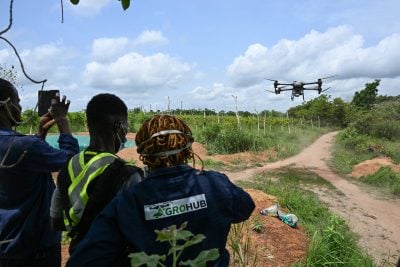The 26th World Economic Forum on Africa (WEF Africa) will take place in Kigali, the capital of Rwanda, from 11th–13th May. The annual gathering, which brings together leaders in business, civil society and government from across Africa and the globe, is an influential platform in shaping the continent’s business and policy landscape. This year’s theme is Connecting Africa’s Resources through Digital Transformation.
With innovation in technology redefining the spheres of business, government and citizens’ daily lives globally, Africa finds itself at a historic crossroads. Having effectively missed the industrial revolution, the continent has a unique opportunity to capitalise on the technology revolution and leapfrog other regions to position itself as a key player in the 21st century.
The potential for such leapfrogging has already been demonstrated. The mobile telecommunications revolution which has swept the continent – there are now well over half a billion active connections on the continent – caught much of the world by surprise. It has also allowed Africa to innovate in unique ways.
Kenya is the global leader in mobile money, and continued innovation is unlocking the potential application of mobile communication to everything from education and healthcare to governance and trade.
Access to international bandwidth is also undergoing a transformation. There were no fibre-optic cables connecting the continent in 2000, but now there are more than a dozen covering every region. While access remains limited, often confined to coastal urban centres where cables make landfall, investment into fibre networks across Africa is at an all-time high. While challenges remain, there is growing optimism about a technology revolution.
These trends have already transformed the lives of millions – from the basic ability to communicate, to service delivery by mobile device and civil society driven initiatives such as Kenya’s Ushahidi to hold governments to account.
They are also fuelling a tide of entrepreneurship among Africa’s young population, the majority of which is under 25 years old. From Accra to Nairobi, Lagos, Cape Town and Addis Ababa, tech hubs are springing up, eager to catalyse investments into digital giants of the future. The Nigerian start-up, Andela, which seeks to train world class developers across Africa, epitomises this new generation of entrepreneurs.
With big money backing from US-based Spark Capital, which counts Twitter and Tumblr among some of its exits, it is a clear demonstration that Africa and cutting-edge technological innovation go hand in hand.
Beyond communications
Yet while the seemingly unstoppable rise of mobile and the internet is profoundly reshaping the world of business and politics, there is a need to go beyond communications if Africa is to harness the potential offered by technology.
This was the message from Calestous Juma, the renowned Kenyan academic and Professor at the Harvard Kennedy School. In a piece published on the WEF blog entitled ‘How can Africa master the digital revolution?’ he argues that ‘digital connectivity has to be defined in a more comprehensive way that goes beyond traditional communication.’
He goes on to say that ‘concerted efforts will need to be made to train a new generation of Africans to ensure they are able to understand these emerging digital technologies and grasp the associated entrepreneurial opportunities.’
Momentum is gathering around efforts to develop a comprehensive science and technology agenda for the continent – one that will allow governments, businesses and entrepreneurs to not only tap into global technology trends, but drive local innovation to shape the global technology debate.
This ambition was encapsulated in the recently held New Einstein Forum Global Gathering, which took place in Dakar, Senegal, in March. The first gathering of its kind on the continent, it brought together leading figures in science, policy, business and civil society. The Dakar Declaration issued after the gathering included the ambitious goal of ‘increased investment in Science and Technology to reach 0.7% of GDP by 2020 and 1% of GDP by 2025.’
The next gathering will take place in Kigali in 2018. The choice of venue is reflective of Rwanda’s strides in driving growth and development in recent years. The imagery that characterised the country throughout the 1990s has now been left far behind, and its economy has been growing rapidly (including double digit figures) in recent years.
Kigali is renowned as one of Africa’s safest cities, and the country’s government is widely credited with exhibiting exceptional leadership in driving its development strategy.
Global shifts
Technology sits at the heart of this. Rwanda has invested heavily in developing its communications infrastructure, with a view to becoming a regional information and communications technology hub.
Exhibiting the kind of awareness called for by Calestous Juma in his article, this investment in technology goes beyond communication. There are plans to construct a network of so-called drone ports to facilitate cargo deliveries across the country. Such a model could be deployed across Africa, literally leapfrogging the need for traditional transportation infrastructure and addressing one of its key logistics challenges.
Rwanda is not the only country to break new ground in the application of drone technology. In Ethiopia, a project is under way to deploy drones to control tsetse-transmitted trypanosomosis in agrarian regions by dropping sterilised flies in key areas. Malawi is testing the use of drones to distribute HIV medication to rural populations – people otherwise effectively cut off from health services.
These initiatives clearly demonstrate the revolutionary potential presented by global shifts in technology. Africa finds itself uniquely positioned to take advantage of this.
Want to continue reading? Subscribe today.
You've read all your free articles for this month! Subscribe now to enjoy full access to our content.
Digital Monthly
£8.00 / month
Receive full unlimited access to our articles, opinions, podcasts and more.
Digital Yearly
£70.00 / year
Our best value offer - save £26 and gain access to all of our digital content for an entire year!

 Sign in with Google
Sign in with Google 




